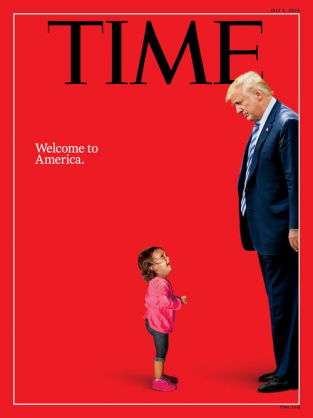Related Posts
While the President signed an executive order on immigration yesterday, ending his administration’s policy of separating parents and children at the border for detention, the crisis is not over. An estimated 2,342 migrant children, to whom the new order does not apply, are being detained with no clear plan or timeline for reuniting them with their parents. In addition, the Trump administration’s unilateral actions this spring to implement a “zero-tolerance” policy on immigration – despite disagreement from both Republicans and Democrats in Congress – have raised to a new high fears and concerns about the health of our democracy. This President has shown he can turn off policies when it suits his purposes – and turn them back on again.
Republican platform and recent policy
From the GOP platform statement:
The family is the bedrock of our nation. When American families flourish, so too does our country. Our Party’s economic and social policies, including tax reform, education, health care, and the sanctity of life, should always promote and strengthen that most sacred bond.
If we define families to include the full range of families, including LGBTQ families, people without children and other variations, I support the first two sentences of the Republican party’s platform statement.
I cannot see any way in which the administration’s recent policy – one that has separated children from parents who allegedly entered the country illegally – is anything other than cruel, manipulative, dangerous to our democracy and a violation of the very values on which this country of immigrants (including my paternal grandparents) was founded.
So much already has been written and said by people from every point on the political spectrum. Without being duplicative, I want to add a few strong affirmations.
Outrage everywhere

Photo-Illustration courtesy of TIME. Photographs by Getty Images.
It’s striking that so many people, from such various political perspectives and a wide range of organizations, have weighed in on the president’s policy. The Consortium of Universities for Global Health (CUGH) wrote compellingly to the President, decrying the policy:
The U.S. administration’s forced removal of children from their migrant parents will damage these children and their families. As health professionals, we know that trauma in early life can contribute to future disease, disability and social impairment. This policy, of inflicting punishment on children to dissuade their parents from migrating, is exceptionally cruel and violates the UN Convention on the Rights of the Child.
The migrants your administration is apprehending are asylum seekers. They are fleeing northward to protect their children from the extreme violence affecting South and Central America. (Seventeen of the world’s 20 most violent nations are in this region.) Children in Honduras, Guatemala and El Salvador are being forced to join criminal gangs or are killed if they refuse to do so. Parents are left with a horrible choice – remain and risk your children being killed in drug violence or flee northwards in the hope of finding sanctuary in the United States. Thousands of desperate parents, their children in tow, take the latter option. Some parents are so desperate they send their children northward, unaccompanied.
It is also important to highlight that during this long and dangerous trip, more than 60 percent of the women and girls are raped, according to Amnesty International. In short, these people are fleeing because they are victims, not criminals. They are seeking asylum and are not threats to public safety.
Health Behavior student says it’s personal
Maribel Sierra is a Master of Public Health student in health behavior at the Gillings School, currently a research intern at Human Impact Partners. Part of a family of immigrants, she wrote an eloquent blog post, in which she said:
I am no stranger to grappling with the realities that face communities of mixed documentation status, yet my familiarity with the issues does not make overcoming them any easier. At homes, schools, and places of worship, I have often heard the hushed conversations of worries and fears people have of the possibility that a family member might get detained by law enforcement who could call ICE. Sometimes, our worst fears are realized, and a family member, friend or neighbor may no longer be part of the community because they have been detained by ICE.
It’s essential that we take opportunities to listen to the stories of people impacted by immigration detentions and deportations.
As Ms. Sierra said, immigration policies are personal. They affect people all around us. Many organizations have recognized that separating families is a public health issue whose long-term impact on individuals and families could be profound. I concur with them. The conditions in which children are being kept could promote the spread of infectious diseases and pose other health risks, including long-term mental health risks.
The policy of separating families is, as CUGH leaders pointed out in their letter (above), cruel and unusual punishment. As far as I am concerned, it violates the very principles on which this country was founded. I believe that, as Americans, we want to be kind, open-hearted and generous, to share the values of democracy and freedom, and to open our hearts and borders to people fleeing oppression. It feels as though we are navigating our way through a terrible, dark swamp. You don’t need to be a policy wonk to know this is bad policy.
Barbara
The views expressed in this blog are Barbara Rimer’s alone and do not represent the views and policies of The University of North Carolina or the Gillings School.

